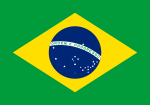
João Baptista de Oliveira Figueiredo was a Brazilian military leader and politician who served as the 30th president of Brazil from 1979 to 1985, the last of the military regime that ruled the country following the 1964 Brazilian coup d'état. He was chief of the Secret Service (SNI) during the term of his predecessor, Ernesto Geisel, who appointed him to the presidency at the end of his own term.

Tonelero is the name of a street located in the neighbourhood of Copacabana in the city of Rio de Janeiro, Brazil. It is named after the Battle of the Tonelero Pass. The Siqueira Campos and Cardeal Arcoverde stations of Line 1 of the Rio de Janeiro Metro are accessible from this street.

Events in the year 1951 in Brazil.

Events in the year 1952 in Brazil.

Events in the year 1955 in Brazil.

Events in the year 1953 in Brazil.

Events in the year 2000 in Brazil.

Events in the year 1960 in Brazil.

Otávio Mangabeira was a Brazilian politician, professor, and engineer. He served as governor of Bahia, represented Bahia in the Senate of Brazil, and was the Minister of Foreign Affairs from 1926 to 1930.
The Republican Party of Rio Grande do Sul was a Brazilian political party founded on February 23, 1882. It was dissolved in 1937 due to the Estado Novo.

Lutero Sarmanho Vargas was a Brazilian physician, diplomat, and politician. He was the oldest son of former President of Brazil Getúlio Vargas.

Gregório Fortunato was the head of the personal guard of Brazilian president Getúlio Vargas. Fortunato was also known as Anjo Negro, due to his size, physique and his black skin.

Levi Fernandes Carneiro was a Brazilian lawyer, jurist and writer. He was a judge of the International Court of Justice.
Alcino João do Nascimento was a Brazilian construction worker. He gained notoriety for being one of the convicted for the assassination attempt of journalist and politician Carlos Lacerda, which became nationally known as the Rua Tonelero shooting.

Rua Tonelero shooting was an attack with political bias, which aimed to assassinate the journalist and politician Carlos Lacerda. The attack occurred on the night of August 5th, 1954, in front of Lacerda's residence at Rua Tonelero, 180, in Copacabana, Rio de Janeiro. The attack led to the death of Air Force Major Rubens Florentino Vaz and wounded municipal guard Sálvio Romeiro.

The effort to impeach Getúlio Vargas was a process open aiming to remove Getúlio Vargas from the Presidency of Brazil in 1954.

The second presidency of Getúlio Vargas corresponds to the period of Brazilian political history that began on January 31, 1951, after he won the 1950 presidential election by direct vote with 3,849,040 against 2,342,384 for Eduardo Gomes, becoming the 17th President of Brazil; and ended on August 24, 1954, with his suicide and the vice-president, Café Filho, taking office.
Rubens Florentino Vaz was a Brazilian military officer in the Brazilian Air Force. He was shot and killed by then president Getúlio Vargas's bodyguard Gregório Fortunato in an attempt to assassinate Carlos Lacerda, one of the most prominent opposition voices to the Vargas presidency.

The presidency of Juscelino Kubitschek began on January 31, 1956, after he won the 1955 Brazilian presidential election, and ended on January 31, 1961, when Jânio Quadros took office.













